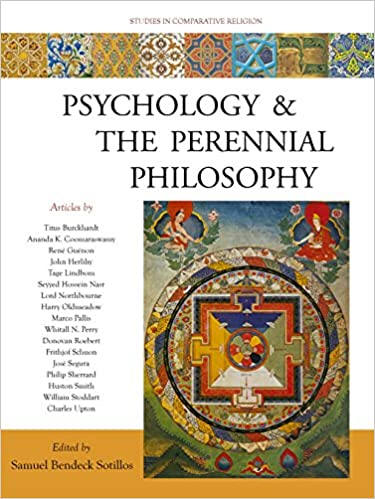Catholic Medical Quarterly Volume 71(2) May 2021
Book Review
Psychology and the Perennial Philosophy.
Edited by Samual Bendeck Sotillos Publisher: World Wisdom Books
Reviewed by Dr Pravin Thevasathan
 The
perennial philosophy is a philosophical position which claims that the
different religious traditions of the world possess a common core of
metaphysical truths. This is not far removed from the Catholic position,
which claims that the virtue of religion is natural to man. In other
words, we do not need supernatural grace in order to believe God exists
and ought to be worshipped. This fascinating work points out that modern
psychology has largely rejected a metaphysical understanding of man. It
has been impoverished by its rejection of the spiritual traditions of the
world.
The
perennial philosophy is a philosophical position which claims that the
different religious traditions of the world possess a common core of
metaphysical truths. This is not far removed from the Catholic position,
which claims that the virtue of religion is natural to man. In other
words, we do not need supernatural grace in order to believe God exists
and ought to be worshipped. This fascinating work points out that modern
psychology has largely rejected a metaphysical understanding of man. It
has been impoverished by its rejection of the spiritual traditions of the
world.
Eckhart Tolle is listed among the most spiritually influential persons in the world. Like many "spiritual" persons, he identifies with no particular religion. In a devastating critique of his famous work The Power of Now, Harry Oldmeadow points out that its greatest limitation is his inability to grasp metaphysical and cosmological principles: there can be no proper spiritual therapy without an adequate metaphysics. What Tolle ends up presenting us with is a "jumble of ideas" that are "ransacked from Zen, Yoga, Sufism, Christianity and modern psychology." The reviewer continues:" the rights of religion are usurped, the spiritual is degraded to the level of the psychic...this kind of psychism, infra-intellectual and anti-spiritual, is endemic in the New Age Movement." Tolle's claims, says the reviewer, are nothing more than that based on subjective "inner experiences." Rather like the inner experiences that Catholic Modernists used to talk about, perhaps.
Ken Wilber is well known for his integral theory, a theory that attempts to synthesize all human knowledge and experience. In a really helpful chapter, Jose Segura argues that Wilber has a reductionist understanding of religion. Wilber believes that Jurgen Habermas is key to understanding the meaning of religion, even though Habermas is a rationalist who rejected any God beyond reason! According to this viewpoint, there can be no possible claim to transcendence. As with Tolle, we see religion once again reduced to subjective inner experiences.
In contrast, Titus Burckhardt, a leading member of the Perennialist School. argues that the soul can only be truly known by what is transcendent. There needs to be a psychology "deriving, in a sense, from above." Burckhardt goes on to observe that "for the majority of modern psychologists, traditional morality...is nothing but a kind of psychic dam, useful on occasion but more often a hindrance or even harmful to the 'normal' development of the individual." Sacramental confession is based on acceptance of an objective moral order. Psychoanalysis, for example, is not.
Samuel Bendeck Sotillos argues that there can be no psychology without an understanding of metaphysics. Modern psychology has largely abandoned metaphysics and it is thus limited to subjective human experiences. By rejecting the transcendent, psychology has reduced man to the sub-human. It is said that when science becomes the new religion, psychotherapy is its place of worship! Sotillos proposes that the New Age Movement and the Human Potential Movement are best regarded as attempts to reduce religion to versions of modern psychology.
This book ably demonstrates that modern psychology has largely rejected the spiritual in man and that the spiritual is essential to the maintenance of good mental health.
